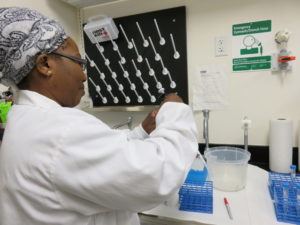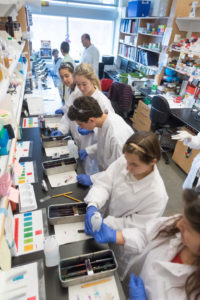More than 50 high school students from five high schools across the state — Poudre, Rocky Mountain, Fort Collins, Fossil Ridge, Rock Canyon and Lone Tree — spent March 26 on Colorado State University’s Foothills Campus to mark World TB Day, which raises awareness about the infectious lung disease tuberculosis and its devastating global impact.
Students got hands-on experience at 10 lab stations, which were coordinated by 14 research teams at CSU.
The high school students, CSU researchers, faculty and staff also heard from Emily Mutandi and Taiwo Oduala, who described what it’s like to be diagnosed with and treated for tuberculosis.
Oduala is a filmmaker, and plans to make a documentary about his experience with TB.
TB survivor’s story
Mutandi, 37, is originally from South Africa. She moved to the United States in 2013 and was diagnosed with TB in 2015.
She was misdiagnosed by doctors multiple times, and was becoming increasingly frustrated.
“The doctor told me, ‘You have a respiratory virus. You need to go back home, and have soup and drink water,'” she said.
Eventually, Mutandi was diagnosed with TB after having a CT scan conducted at Denver Health.
But she had reached rock-bottom before that hospital visit. Her heart rate was unusually high, she couldn’t eat or sleep, had a bad headache and was very cold. After being misdiagnosed with pneumonia and spending two weeks in the hospital, Mutandi lost more than 40 pounds. She was even starting to hallucinate.

“The whole night I was shaking,” she said, reflecting back on a scary time in her life. ” In the afternoon, I said [to myself], I think I might die.”
Following the diagnosis of multidrug-resistant tuberculosis, she was quarantined for five months, and on treatment for nine months.
Her treatment required her to take 21 pills a day, at the same time.
Having survived this experience without any family close by, Mutandi decided to work in the hospital, to help others. She started out as a patient transport specialist and is also now working as a respiratory technician.
“Don’t be shy to tell people about tuberculosis,” she said. “I tell everyone that I’m a TB patient. I was, and now I don’t have it.”
Increasing awareness about TB
Nicole Kruh-Garcia, an assistant professor in the Department of Microbiology, Immunology, and Pathology, said hosting World TB Day at CSU is important because so few people in the U.S. realize that tuberculosis is still a problem.
“We want to get the word out not only about the prevalence of the disease, but also about the work that we do here at CSU,” she said, noting that 20 research labs at the university focus on mycobacterium, which is a group of bacteria that causes TB and leprosy.
Kruh-Garcia, who organized the event with Karen Dobos, an associate professor in the Department of Microbiology, Immunology and Pathology, said TB is, unfortunately, making a comeback in many parts of the world. Dobos also serves as director of the Research Integrity and Compliance Review Office at CSU.

“It’s not going away anytime soon,” Kruh-Garcia said. “Drug resistance is increasing and what we’re focusing on at CSU includes new vaccines to prevent TB and diagnostics to identify cases as rapidly as we can, so that we can get people on treatment as fast as possible, before TB is spread. Several labs are focusing on drug development and research so that we can combat drug-resistance strains to try and shorten treatment.”
The collaborative lab team managed by Kruh-Garcia and Dobos is conducting biomarker research, trying to identify bacterial proteins in blood and sputum to diagnose TB and monitor treatment efficacy.
World TB Day
The global event marks Dr. Robert Koch’s discovery of Mycobacterium tuberculosis as the cause of TB on March 24, 1882. Koch was a German physician known as the founder of modern bacteriology; he won a Nobel Prize for his work.
Mycobacteria Research Laboratories
The MRL, in the Department of Microbiology, Immunology, and Pathology of the College of Veterinary Medicine and Biomedical Sciences, houses more than 150 scientific investigators, staff and students working on innovations to diagnose, prevent, and treat tuberculosis and related diseases. They compose the largest group of university researchers in the world focused entirely on this category of infectious disease.
Why Colorado?
Our state has historical ties to TB: In the early 1900s, Colorado was called the “World’s Sanatorium” because TB patients came here in droves, seeking remedy from sunshine and clean, dry air. The CSU veterinary program, founded in 1907, focused on eradicating tuberculosis from dairy cattle because infected animals can transmit TB to people through raw, unpasteurized milk.